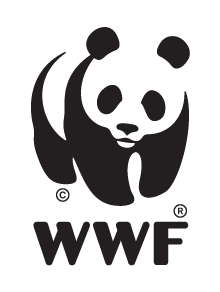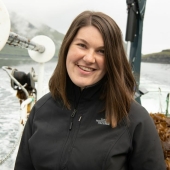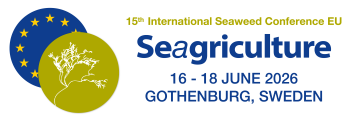About the speaker:
In her role at WWF-US, Bailey supports the seaweed industry in reducing barriers to growth and advancement in order to improve ocean health, coastal community resilience, and climate. Her current region of focus is the Eastern Pacific to the North Atlantic, and recently a new project in East Africa. She oversees grants to community organizations and research institutes focused on projects ranging from the ecosystem services of seaweed and shellfish farming to installation of demo farms in new communities. She develops workshops aimed at driving new markets for seaweed, including as a livestock feed and alternative packaging material, bringing together stakeholders across the respective value chains. Bailey brings 10 years of marine science, education, and aquaculture experience. Prior to WWF, Bailey ran a commercial kelp nursery and a research-scale scallop farm in Maine. She has worked on seaweed farming projects in coastal communities in Madagascar and Belize as part of her graduate studies. Her research centered on a women’s association developing new seaweed-based products. She holds a BA in Earth & Oceanographic Science from Bowdoin College and a Professional Science Masters in Ocean Food Systems from the University of New England.
Company info:

As the world’s leading conservation organization, WWF works in nearly 100 countries. At every level, we collaborate with people around the world to develop and deliver innovative solutions that protect communities, wildlife, and the places in which they live.
Presentation:
Social and economic contexts will impact where and how the seaweed industry can scale. New farms operate in public waters and therefore must gain permission through a public process influenced by social license and public perception. In particular, regional acceptance of seaweed aquaculture could have momentum, yet still be extremely unfavorable in a specific local harbor given competing interests in that ocean space and viewshed, as well as messaging and information community members are receiving. To gain locally grounded insights to inform WWF’s work to build and strengthen social license for seaweed aquaculture amongst local communities, they sought to understand the range of public perceptions regarding specific aquaculture targets (e.g. fish, shellfish, seaweed) at the local scale. They developed an integrated, reproducible AI-human approach to retrieve content from local and global media sources and assess sentiment and perceptions. This presentation will discuss how findings from an analysis of over 5,500 media articles on trends in evolving sentiment in key geographic regions compare to global trends as well as thoughts on how this tool may be useful for conducting further assessments in other regions going forward.



